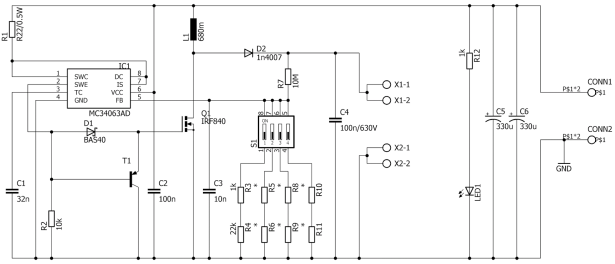A small and cheap 5V/400V DC/DC converter can be useful in many DIY projects, e.g Geiger–Müller counters. I will present here one of such DC/DC converter based on popular MC34063 chip in step-up configuration.One big limitation of this device is little output power, but for many applications this won’t be a problem.
Another problem is poor temperature stability, but this could probably be improved by using low tolerance C1, R7-R11.Q1, L1, D2 are coil-based step-up converter. Q1 should be a power MOSFET rated a bit more than the output voltage. Empirical tests have shown that Q1 didn’t heat up, so I didn’t mount it on a radiator. D2 and C4 rectifie output voltage, they also should be rated for bigger voltage than the output. To improve performance, D2 can be replaced by a Schottky diode, capacitance C4 can be increased. R3-R11, C3 provide output feedback to the MC34063. S1 is used to select output voltage if needed.Such high output voltage can be dangerous (even while the maximum curent iof this converter s small), so if you make the same or similar device, please be careful. If you are interested in higher voltage, you ma take a look on The Geiger–Müller counter is a relatively simple tool to measure ionizing radiation. To increase sensitivity, construction presented here contains three (instead of one as usually) soviet STS-5 lamps. This is important for measurements of natural sources of (low) radiation like soil, rocks (an article about my trip with Geiger–Müller counter on Śnieżka mountain).When high voltage (typically 380-420V) is applied to the Geiger–Müller tube, the tube doesn’t conducts electricity, but it does conducts for a short period, when radiation particle is observed. Those pulses are observed by the detector. The level of ionizing radiation is proportional to the amount of pulses detected in a constant interval of time (typically from 20s to 2,5min).
For more detail: 5V/400V DC/DC converter


